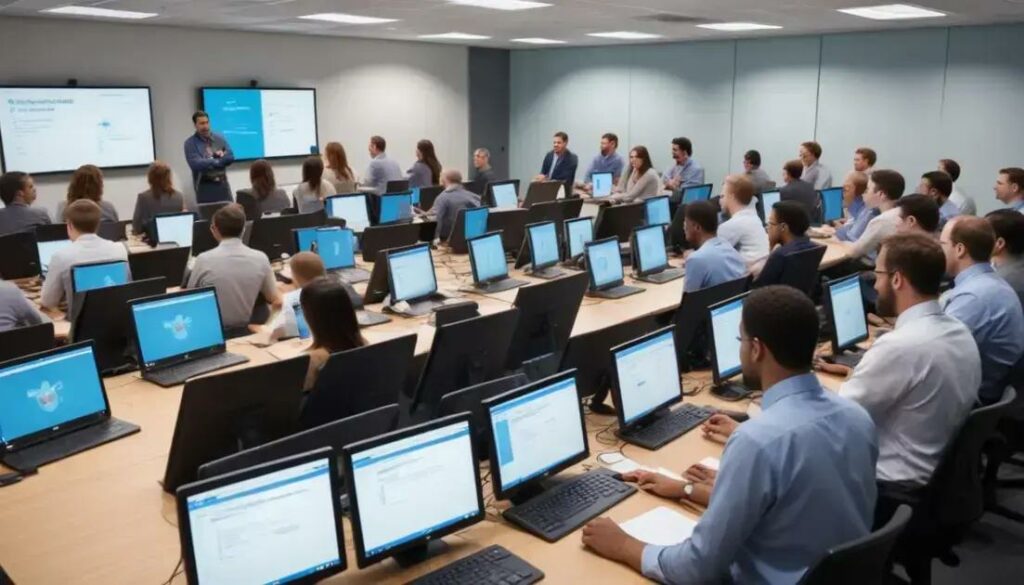Are you ready to jumpstart your IT career? The CCNA certification is a vital stepping stone for anyone looking to excel in networking. In this article, we’ll explore how various CCNA courses can prepare you for success!
Introduction to CCNA Certification
CCNA stands for Cisco Certified Network Associate. It is a valuable certification for anyone looking to work in networking. With CCNA, you learn the basics of networking, including how to set up and manage networks. This certification covers essential topics like IP addressing and network security.
So, why should you consider getting your CCNA? First, it boosts your resume. Employers often look for candidates with this certification. It shows you have proven skills in networking. Plus, it opens doors to job opportunities in the tech field.
CCNA courses can help you gain a solid understanding of how networks function. You’ll learn about routers, switches, and protocols. All these play a big part in keeping networks running smoothly. The training often includes hands-on labs, so you get practical experience.
Another great thing about CCNA is its community. You’ll connect with other learners and professionals who share your interest in networking. This can lead to valuable networking opportunities. Engaging with peers can also make studying more enjoyable.
Finally, CCNA can be a stepping stone for further certifications. Once you have your CCNA, you can explore advanced topics in networking. This could lead to even better career options in the future!
Key Features of CCNA Courses

CCNA courses offer a wide range of key features designed to help you succeed in networking. First, they focus on essential networking concepts. You’ll learn about the OSI model, which is crucial for understanding how networks communicate.
Another important feature is hands-on training. Many courses provide labs where you can practice your skills. This practical experience is vital for building confidence and competence in real-world scenarios.
The courses also cover IP addressing and how to configure routers and switches. Understanding these topics is key to managing networks effectively.
Some courses even include network security training. This is essential as security is a top concern for businesses. You’ll learn how to protect networks from various threats.
Moreover, many CCNA courses are flexible. They often offer online or in-person options to fit your schedule. This flexibility allows you to learn at your own pace.
Additionally, CCNA courses often provide access to resources like study guides and practice exams. These aids can be very helpful when preparing for the certification exam.
Networking with peers is another benefit. These courses often encourage collaboration and discussion. Sharing ideas can deepen your understanding and make studying more enjoyable.
Finally, completing a CCNA course gives you credibility in the job market. Employers recognize this certification as a sign of your skills and commitment to your career. This can make a big difference when you’re applying for jobs!
Learn Networking Basics: IP Addressing and OSI Model
Understanding networking basics is essential for anyone starting with CCNA. Two key concepts are IP addressing and the OSI model. Let’s break these down.
IP addressing refers to how devices on a network identify each other. Each device gets a unique IP address, similar to a home address. This is important for sending and receiving data correctly.
There are two types of IP addresses: IPv4 and IPv6. IPv4 is the most common, using four sets of numbers. For example, 192.168.1.1 is an IPv4 address. IPv6 was created to solve the shortage of IPv4 addresses, using longer numeric sequences.
Now, let’s talk about the OSI model. This model explains how different parts of a network interact. It breaks networking into seven layers, making it easier to understand. Each layer has its own role in data communication.
The seven layers are: Physical, Data Link, Network, Transport, Session, Presentation, and Application. Starting from the Physical layer, we deal with the actual hardware, like cables and switches.
As we move up, the layers handle more complex tasks, like ensuring data is received correctly. Knowing how these layers work together helps you solve network issues faster.
Therefore, grasping IP addressing and the OSI model is key to your success in networking. These fundamentals form the backbone of everything you’ll learn in CCNA!
Advanced Topics in Routing and Switching

Advanced topics in routing and switching are crucial for anyone aiming to master networking. After learning the basics, it’s time to dive deeper. These topics help you manage complex networks.
One key area is routing protocols. These protocols help routers communicate with each other. Popular protocols include BGP, OSPF, and EIGRP. Each has unique features and uses. For example, OSPF is often used in larger networks because it scales well.
Next, let’s discuss VLANs, or Virtual Local Area Networks. VLANs allow you to segment networks without needing additional hardware. This enhances security and performance. You can group devices by function rather than physical location.
Another advanced topic is Quality of Service (QoS). QoS ensures that critical applications get the bandwidth they need. This is especially important in voice and video applications where delays can affect performance.
Finally, look into network redundancy and high availability. These concepts ensure that networks remain online, even if some devices fail. Technologies like Spanning Tree Protocol (STP) help prevent loops and maintain smooth operations.
Learning these advanced topics enhances your skills and prepares you for real-world challenges. They’re vital for any IT professional aiming for a successful career in networking.
Importance of Network Security for CCNA
Network security is a critical part of CCNA training. It helps protect networks from threats and attacks. As more devices connect to the internet, the need for security grows.
One key aspect of network security is understanding firewalls. Firewalls act as a barrier between trusted and untrusted networks. They monitor incoming and outgoing traffic based on security rules.
Another important topic is encryption. Encryption secures data by converting it into a code. This helps keep your information safe, especially when it’s transmitted over the internet.
Also, learning about virtual private networks (VPNs) is vital. VPNs create a secure connection over the internet. They are useful for remote workers to access company resources safely.
A strong focus on user authentication is necessary as well. This means verifying who can access the network. Common methods include passwords, security tokens, and biometric scans.
Moreover, having a response plan for security incidents is crucial. It helps organizations react quickly if a breach occurs. This way, they can minimize damage and restore operations faster.
In short, understanding network security is essential for anyone pursuing CCNA. It helps you protect networks and ensures safe communication.
Hands-On Experience with Cisco Tools

Getting hands-on experience with Cisco tools is a crucial part of CCNA training. This practical experience helps reinforce what you learn in classes. Working directly with Cisco devices makes concepts clearer.
One important tool is Cisco Packet Tracer. This simulation software allows you to design, configure, and troubleshoot networks. It’s user-friendly and great for beginners. You can practice without needing real hardware.
Another vital tool is Cisco IOS (Internetwork Operating System). It’s the software that runs on Cisco routers and switches. By learning IOS commands, you gain skills to manage devices effectively.
Additionally, using real Cisco equipment is beneficial. If you have access to hardware, it can provide a richer learning experience. Setting up routers and switches helps you understand physical connections and configurations.
Practicing with labs is essential. Many CCNA courses offer hands-on lab sessions. This experience helps you apply theory in real-life situations. You can resolve issues as they arise, which builds your confidence.
Also, participating in group study sessions can enhance learning. Working with peers on lab exercises allows for collaboration. You can share tips and solve challenges together.
Ultimately, hands-on experience with Cisco tools prepares you for the CCNA exam and real job scenarios. It’s an effective way to turn knowledge into skills you can use in the field.
Career Opportunities After CCNA Certification
After earning your CCNA certification, many exciting career opportunities await. Companies value this credential as it shows you have solid networking skills.
One common job you might get is a network technician. In this role, you’ll set up and maintain networks. You’ll ensure everything runs smoothly and troubleshoot issues as they arise.
Another option is becoming a network administrator. This position involves managing and supporting a company’s network. You’ll handle user accounts, monitor performance, and maintain security.
You could also work as a systems engineer. Here, you’ll design networks that meet specific needs. This role often requires both technical skills and creativity.
If you enjoy a faster pace, consider roles like IT support specialist or help desk technician. These positions focus on helping users solve their tech problems quickly and effectively.
With more experience, you could aim for network architect or security analyst roles. These advanced positions design complex networks and ensure that they are secure.
The demand for networking professionals is strong. As businesses grow, they need skilled individuals to support their networks. Gaining your CCNA can open doors to many rewarding career paths!
Networking Fundamentals for Beginners

Networking fundamentals are essential for beginners in IT. These basic concepts help you understand how devices connect and communicate. Let’s explore some key topics.
The first concept to grasp is network types. There are two main types: LAN and WAN. A LAN (Local Area Network) connects devices in a small area. A WAN (Wide Area Network) covers larger distances, like connecting multiple offices.
Next, you should learn about network devices. Common devices include routers, switches, and hubs. Routers connect different networks, while switches connect devices within the same network. Hubs are simpler devices that also connect multiple devices.
Another important topic is IP addressing. Every device on a network needs a unique IP address. This address helps devices find and communicate with each other. IP addresses can be static or dynamic.
Protocols are another key element of networking. They set the rules for communication between devices. Common protocols include TCP/IP, which is the standard for internet communication.
Finally, it’s essential to understand network security basics. Keeping your network secure is crucial. Learn about firewalls, antivirus software, and basic security practices to protect your data.
By mastering these networking fundamentals, you’ll build a strong foundation for your IT career!
Comparison of Different CCNA Courses
Choosing the right CCNA course can be overwhelming. Many options are available, and they vary by content, delivery style, and cost. Let’s compare a few common types of CCNA courses.
First, there are online courses. These are great for flexibility. You can learn at your own pace and access materials anytime. Some popular online courses include platforms like Udemy and Coursera. They often offer video tutorials and quizzes to help reinforce learning.
Next, we have in-person classes. These courses often provide hands-on labs and face-to-face interaction. Learning in a classroom can be helpful for those who prefer real-time feedback. Check local colleges or training centers for options.
Another option is boot camps. These are intensive, short-term programs designed to help you learn quickly. They often focus on exam preparation and may include real-time practice. Boot camps can be more expensive, but they promise focused learning.
It’s also worth considering self-paced study materials. Many people use books, study guides, or practice exams to prepare. This method allows for a personalized learning experience, but it requires more self-discipline.
Lastly, look for certification preparation courses. These are specifically designed to help you pass the CCNA exam. They often include practice tests and exam tips to boost your confidence.
When comparing courses, consider your learning style, budget, and schedule. This will help you choose the best CCNA course for your needs.
Conclusion and Next Steps in Networking

As you reach the end of your CCNA journey, it’s time to reflect on what you’ve learned. Networking is an important field in today’s tech-driven world. Understanding the core concepts gives you a strong foundation for your career.
To move forward, consider what area of networking excites you most. It could be security, wireless networking, or cloud solutions. Each area offers unique challenges and opportunities.
Next, think about additional certifications. Certifications like CCNP or security-focused credentials can help expand your skills. They can also make you more attractive to employers.
Networking communities can provide great support. Joining forums, discussion groups, or local meetups helps you connect with others. Sharing knowledge and experiences can lead to great collaboration.
Hands-on practice is essential. Keep working on labs, simulations, or real-world projects. The more experience you gain, the more confident you’ll become.
Finally, stay updated on industry trends. Technology changes rapidly, and continuing education is key. Subscribe to blogs, podcasts, and webinars to keep learning.
With your CCNA knowledge, you’re ready to explore exciting pathways in networking!




